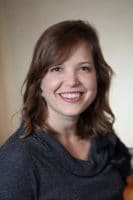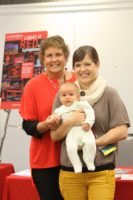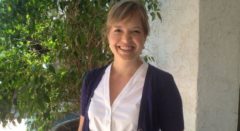Juliana, Follicular Lymphoma Survivor
I was diagnosed with follicular lymphoma in 2011. At the time of this diagnosis, I 
I’d had a different kind of cancer in 2004, which was isolated. This cancer was removed and I’d had chemotherapy for it. During a routine follow up exam with my oncologist for the 2004 cancer, I mentioned the enlarged nodes, and he suggested checking things just to be sure. After having several scans, my results came back as “suspicious for metastatic disease.”
“Even though I felt well, I had enough medical background, plus my experience with my first cancer, that I had a lot of fears.”
It was a unique experience because I didn’t know whether this was the return of my first cancer or if this was something new. I was very scared and found myself thinking about it when I was lying in bed. Even though I felt well, I had enough medical background, plus my experience with my first cancer, that I had a lot of fears. After being told I had lymphoma, I felt a strange sense of relief because I finally knew what it was. I didn’t know what it meant, though, and had a lot of questions.

My initial diagnosis was stage IV, grade 3a follicular lymphoma, which meant I would need to have extensive chemotherapy. Because of the treatment I received for my first cancer, this was complicated because I had already had the maximum life-time allowed dosage of one of the chemotherapy drugs recommended. I remember thinking, “I’ve got to stop my life. I’ve got to have intensive chemotherapy.” After I went for a second opinion, my cancer was graded differently. It was diagnosed as a lower grade, which meant I didn’t need to do chemotherapy, but I did have rituximab, which is a monoclonal antibody and is very well tolerated. I was fortunate because I didn’t have any side effects from this treatment. I ended up only needing to have rituximab (Rituxan) and prednisone, and I think the benefit of seeking a second opinion was huge because the physician I saw for the second opinion was a lymphoma expert.
The lymphoma specialist was incredible! She had extensive knowledge of treatments – current and new ones – and the specifics of each of the types of lymphoma. I remember her saying to me, “After I see you today, I’m actually leaving to go out of country to an international conference that will be all about the latest treatments for your illness.” And I thought, “Wow, that’s amazing.”
My treatment was rituximab, which I had once a week for four weeks, and then again six months later for a total of three cycles. In April of 2013, I had a scan that was completely clear, and all the lymph nodes were gone. It was a great feeling for me because it was stage IV where it was just all throughout my body, above and below my diaphragm and in the bone marrow.
“Get a second opinion and get connected with other people who have the same type of lymphoma because this made me feel incredibly hopeful.”
I didn’t know about the Lymphoma Research Foundation (LRF) until about a year after my diagnosis. I attended an educational forum sponsored by LRF, and got a better understanding about my disease and what LRF offers. I realized I could do research on the LRF website, and it was very helpful and educated me on my specific disease. I also reviewed the literature I received during the presentations, then went home and discussed my findings and the possibility of changing my treatment plan with my oncologist. He agreed, and thus we stopped doing the rituximab in a shorter amount of time than what we had originally planned.
My advice to a newly diagnosed patient is to get a second opinion and get connected with other people who have the same type of lymphoma because this made me feel incredibly hopeful. Learning all you can about your specific cancer can help when the information is from the right place because it will answer a lot of questions you have about the unknown. Finding other people who have lived through the type of lymphoma that you’ve had is also helpful. Through LRF’s Lymphoma Support Network, I was put in touch with someone else who had follicular lymphoma; she’d gone through the same treatment I had, and she had a
I was excited to get involved with LRF because I just felt such a profound difference in my life after having gone to that conference, and it made such a difference for me. Soon after, I became involved in the Ambassador program and participated in LRF’s local Lymphoma Walk.
